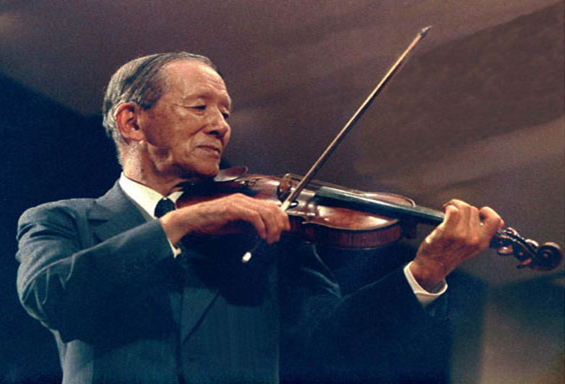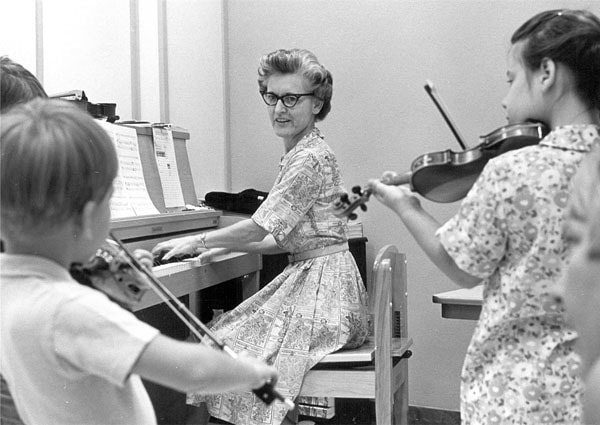The “Mother Tongue” Approach
The “Mother Tongue” approach is based on Dr. Suzuki’s belief that all children can learn when given the opportunity. Every child is expected to speak. Children are lovingly and patiently taught their native language by absorbing what they hear around them. They repeat the sounds they hear as they slowly and constantly build their own vocabulry. Listening, imitation, and repetition are also the key building blocks in learning to play an instrument.
Encouraging an Early Start
We are never too old to learn, but it is more natural and more effective when the child gets an early start. A three-year-old child can begin their instrument specific music education via the Suzuki Method.
Parent Involvement is Crucial
The involved parent is the “practice partner” at home. The parent attends every lesson, takes notes on assignments, and directs home practice with the teacher’s guidance and supervision. The teacher has great trust in the parent as the teacher guides the parent through every step.
Daily Listening
Students listen to their current pieces daily and repeatedly, just as they do when learning a language. They listen to familiarize themselves with what they will be learning, and the maintain and build their skill base.
Learning by Repetition
Students constantly review and refine the pieces that they have learned. This in turn strengthens memory, solidifies technique, and develops musical expression.
Step-by-Step Mastery
Each skill and piece of music is broken down into the most basic units, which are carefully mastered before continuing. This insures a child’s ease of playing and ultimate success in performance.
Positive Reinforcement Promotes Success
Enjoyment is an important part of the learning process. The teacher and parent praise the child’s progress. They find supportive and creative ways to work towards further improvement.
Weekly Individual and Group Lessons
Individual lessons provide the parent and child with the tools they need to work together at home. Group lessons provide an opportunity for a student to practice those skills with others, review the materials from the private lesson, and gain confidence and inspiration from other students.
Parent-Teacher-Child Triangle
The responsibility of the child’s progress lies with the parents and the teacher. They work together to nurture ability. They are the base that hold up the child at the top of this triangle. They not only instill a music education, they work together to develop the whole child.
The “Mother Tongue” approach is based on Dr. Suzuki’s belief that all children can learn when given the opportunity. Every child is expected to speak. Children are lovingly and patiently taught their native language by absorbing what they hear around them. They repeat the sounds they hear as they slowly and constantly build their own vocabulry. Listening, imitation, and repetition are also the key building blocks in learning to play an instrument.
Encouraging an Early Start
We are never too old to learn, but it is more natural and more effective when the child gets an early start. A three-year-old child can begin their instrument specific music education via the Suzuki Method.
Parent Involvement is Crucial
The involved parent is the “practice partner” at home. The parent attends every lesson, takes notes on assignments, and directs home practice with the teacher’s guidance and supervision. The teacher has great trust in the parent as the teacher guides the parent through every step.
Daily Listening
Students listen to their current pieces daily and repeatedly, just as they do when learning a language. They listen to familiarize themselves with what they will be learning, and the maintain and build their skill base.
Learning by Repetition
Students constantly review and refine the pieces that they have learned. This in turn strengthens memory, solidifies technique, and develops musical expression.
Step-by-Step Mastery
Each skill and piece of music is broken down into the most basic units, which are carefully mastered before continuing. This insures a child’s ease of playing and ultimate success in performance.
Positive Reinforcement Promotes Success
Enjoyment is an important part of the learning process. The teacher and parent praise the child’s progress. They find supportive and creative ways to work towards further improvement.
Weekly Individual and Group Lessons
Individual lessons provide the parent and child with the tools they need to work together at home. Group lessons provide an opportunity for a student to practice those skills with others, review the materials from the private lesson, and gain confidence and inspiration from other students.
Parent-Teacher-Child Triangle
The responsibility of the child’s progress lies with the parents and the teacher. They work together to nurture ability. They are the base that hold up the child at the top of this triangle. They not only instill a music education, they work together to develop the whole child.
The Suzuki Music Institute of Dallas (SMID) was founded in 1968 by Dr. Shinichi Suzuki and Dr. Evelyn Hermann (the previous CEO of the International Suzuki Association), to provide learning opportunities and particularly musical training for children according to the Talent Education Philosophy expounded by Dr.Shinichi Suzuki. Paul and Lorraine Landefeld, upon Dr. Hermann’s retirement in 1986, guided the growth of the Institute to its then enrollment of approximately 160 students.
Nicolette Solomon became the Executive Director in May 2005 after the retirement of Paul and Lorraine Landefeld. During her 13 years as director, the school grew to 300 students, with 6 full-time and 6 part time faculty, and tuition offered in violin, viola, cello, bass, guitar, piano, organ, harp, music theory, and composition.
Dr. Rhea Edelman was appointed as the Executive Director in 2018, after being a member of the violin faculty for 6 years.
The Institute has many ties to Japan. Nicolette Solomon studied with Dr. Suzuki at The Talent Education Institute in Matsumoto, Japan. Paul and Lorraine Landefeld spent two years studying there. In February 1995, SMID hosted the Third International Suzuki Piano Basics Workshop and Conference, featuring Mr. Seizo Azuma, Pianist, of Yokohama, Japan, and Dr. Haruko Kataoka, co-founder of the Suzuki Piano method. Also featured were exemplary students of the Talent Education Institute of Matsumoto, Japan. SMID has on several occasions hosted the Japanese Children’s Tour Group featuring Talent Education students from many parts of Japan.
SMID regularly invites artists and recognized pedagogues to conduct master classes and workshops for its students and the community. Fabio Bidini, Dr. Doris Harrel, Nancy Locken, Gerardo Ascheri, Brian Lewis, Fay Adams, Diana Galindo, Lucy Shaw, Michi North and many other fabulous string and piano clinicians from the United States and abroad have been guest teachers at our Institute.
Nicolette Solomon became the Executive Director in May 2005 after the retirement of Paul and Lorraine Landefeld. During her 13 years as director, the school grew to 300 students, with 6 full-time and 6 part time faculty, and tuition offered in violin, viola, cello, bass, guitar, piano, organ, harp, music theory, and composition.
Dr. Rhea Edelman was appointed as the Executive Director in 2018, after being a member of the violin faculty for 6 years.
The Institute has many ties to Japan. Nicolette Solomon studied with Dr. Suzuki at The Talent Education Institute in Matsumoto, Japan. Paul and Lorraine Landefeld spent two years studying there. In February 1995, SMID hosted the Third International Suzuki Piano Basics Workshop and Conference, featuring Mr. Seizo Azuma, Pianist, of Yokohama, Japan, and Dr. Haruko Kataoka, co-founder of the Suzuki Piano method. Also featured were exemplary students of the Talent Education Institute of Matsumoto, Japan. SMID has on several occasions hosted the Japanese Children’s Tour Group featuring Talent Education students from many parts of Japan.
SMID regularly invites artists and recognized pedagogues to conduct master classes and workshops for its students and the community. Fabio Bidini, Dr. Doris Harrel, Nancy Locken, Gerardo Ascheri, Brian Lewis, Fay Adams, Diana Galindo, Lucy Shaw, Michi North and many other fabulous string and piano clinicians from the United States and abroad have been guest teachers at our Institute.

